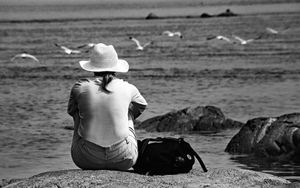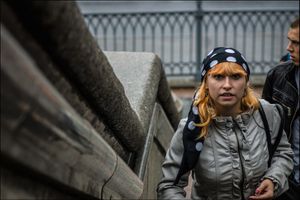This week I began facilitating a new support group. It's always an exciting, but slightly stressful business bringing a new group of women together. Though I rely a great deal on my peer facilitator training guidelines to pre-screen, prepare and introduce each woman into the group — I rely even more on God. Prayer for each of these groups starts many months in advance and goes on throughout the group's duration (and beyond).
What makes group work a little unnerving is the fact that most (or all) of us are trauma victims. For some women the discovery of the sexual betrayal, and often of their husband's double life, are fairly new. They are in the early trauma stages where the world feels highly unsafe and unstable. Emotions swing wildly back and forth between hope, despair; rage and joy. The world is full of triggers that can initiate trauma responses such as an inability to stay present, panic attacks, nightmares... and incredible pain.
So why bother? The whole situation sounds like a mine field — an accident waiting to happen.
Experiencing Trauma in Community
Western culture (which developed out of a Greek mechanistic worldview) is highly individualistic — probably more so than any other culture ever has been. Our individualistic approach has some strengths, but also many weaknesses. The greatest damage I see today is that it encourages isolation.
Thus while ancient people often put on sackcloth and ashes in groups, today we expect those who are injured to withdraw, lick their wounds and stay silent. While neighbors used to support those in their community who had experienced loss, today we leave this to agencies and experts. We have lost the knowledge of how to hold each others' grief and create a safe space for the weak and traumatized.
Of course some traumas are experienced publicly by communities: wars, epidemics, natural disasters. These types of traumas are easier to grieve together. However, I would argue that sexual addiction has become an epidemic — along with all its horrific fallout: sex trafficking, sexual violence and sexual betrayal. Despite this, we feel we need to suffer in silence and isolation.
Surviving and then Thriving... in Community
Every year in the season of Lent/Easter I find myself thinking about how the early church was born out of trauma. I can only begin to guess what the disciples suffered from Jesus' unjust arrest, trial and public murder.
The writer of the Gospel of Mark tells us:
"Some women were there, watching from a distance, including Mary Magdalene, Mary (the mother of James the younger and of Joseph), and Salome. They had been followers of Jesus and had cared for him while he was in Galilee. Many other women who had come with him to Jerusalem were also there."
While the male disciples had fled the scene (with the exception of John) — Jesus' female disciples came together to walk with their Lord through the worst of that horrific time.
In a recent devotional on this passage, Mark D. Roberts writes.
"I wonder if the male disciples were scattered, each one alone in his grief, fear, and shame. We don’t know this for sure, but it wouldn’t surprise me if this had been the case. Yet we do know that the women hung together, and in their community they found strength. They were able to remain faithful to Jesus because they were not alone."
Together they endured... and Jesus appeared first to them, to tell them that the days of Isaiah 23 (... Instead of fine clothes, a donning of sackcloth; and branding instead of beauty) had ended. It was now the days of "beauty for ashes" and "a garment of praise instead of a spirit of despair." (Isaiah 61)
The men had already, by this point, re-formed their community, and together with the female disciples this little band would soon go on to change the world in the power of the Holy Spirit.
Our Communities
It was the discovery of my husband's sexual betrayal in 2010 that would introduce me to the power of women grieving together and supporting each other in their grief.
Today, these are still "my people" (as my mentor Donna Meredith Dixon frequently puts it). Even when the pain and grief is not around betrayal, I have a deep, abiding source of strength from this godly, safe community.
If you do not have safe people to share your journey with, you may want to prayerfully consider what the barriers are. If you are someone who longs for that kind of safe community of women, but haven't been able to find it, feel free to contact:
- me, if you're in New Zealand
- Amanda, if you're in Aussie
- Catherine, if you're in the UK
- Donna or Shelley if you're in the U.S. and
- Coach Katherine, if you're in Canada
If you're a therapist who wants to know how to build safe communities for partners of sex addicts, please contact Dr Barbara Steffens.
A beautiful song that one of my key community members sent around this week. Thank you Donna, for all you do for His hurting daughters.


